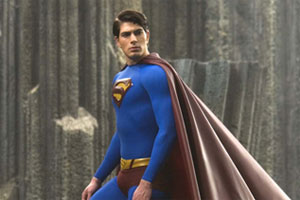 Ok I have seen "The Passion" and while it has many problems, I liked it a lot. I have not made it to Superman yet so I do not have much to comment on this story. But I am looking forward to seeing the new Superman movie! Looks like it could be fun. As for getting the Gospel message out to the masses through a mainstream movie... I am to tired of the thought to even yawn at it anymore. I just don't think that God has plans for a big revival centered around a Hollywood production. Even so it is still beneficial to discern truth and beauty in any art whether it claims to be "Christian" or not. In that spirit I submit this story for your reading enjoyment.
Ok I have seen "The Passion" and while it has many problems, I liked it a lot. I have not made it to Superman yet so I do not have much to comment on this story. But I am looking forward to seeing the new Superman movie! Looks like it could be fun. As for getting the Gospel message out to the masses through a mainstream movie... I am to tired of the thought to even yawn at it anymore. I just don't think that God has plans for a big revival centered around a Hollywood production. Even so it is still beneficial to discern truth and beauty in any art whether it claims to be "Christian" or not. In that spirit I submit this story for your reading enjoyment.
"Ignorance of Scripture is ignorance of Christ." - Jerome
Saturday, July 01, 2006
Superman vs. Gibson's Christ
 Ok I have seen "The Passion" and while it has many problems, I liked it a lot. I have not made it to Superman yet so I do not have much to comment on this story. But I am looking forward to seeing the new Superman movie! Looks like it could be fun. As for getting the Gospel message out to the masses through a mainstream movie... I am to tired of the thought to even yawn at it anymore. I just don't think that God has plans for a big revival centered around a Hollywood production. Even so it is still beneficial to discern truth and beauty in any art whether it claims to be "Christian" or not. In that spirit I submit this story for your reading enjoyment.
Ok I have seen "The Passion" and while it has many problems, I liked it a lot. I have not made it to Superman yet so I do not have much to comment on this story. But I am looking forward to seeing the new Superman movie! Looks like it could be fun. As for getting the Gospel message out to the masses through a mainstream movie... I am to tired of the thought to even yawn at it anymore. I just don't think that God has plans for a big revival centered around a Hollywood production. Even so it is still beneficial to discern truth and beauty in any art whether it claims to be "Christian" or not. In that spirit I submit this story for your reading enjoyment.
Subscribe to:
Post Comments (Atom)

2 comments:
It is beneficial to discern truth and beauty in any art whether it claims to be "Christian" or not.
Agreed!
"E.T." is also supposed to have Christlike overtones, but these "overtones" are much older than Christ's story, because countless earlier "saviors" have had similar myths.
Let's cut to the chase and make a movie about Zoroaster!
Again with the myth. As if throwing out the word disproves something. I think it can do the opposite. For example there are also many "great flood" myths. It is not unreasonable to see all of the flood myths and think, "Maybe there was a flood since everyone was talking about it." As for Christ myths I again point to Tolkien and Lewis on the "true myth".
Myths, Lewis told Tolkien, were "lies and therefore worthless, even though breathed through silver.""No," Tolkien replied. "They are not lies." Far from being lies they were the best way sometimes the only way of conveying truths that would otherwise remain inexpressible. We have come from God, Tolkien argued, and inevitably the myths woven by us, though they contain error, reflect a splintered fragment of the true light, the eternal truth that is with God. Myths may be misguided, but they steer however shakily toward the true harbor, whereas materialistic "progress" leads only to the abyss and the power of evil."In expounding this belief in the inherent truth of mythology," wrote Tolkien's biographer, Humphrey Carpenter, "Tolkien had laid bare the center of his philosophy as a writer, the creed that is at the heart of The Silmarillion." It is also the creed at the heart of all his other work. His short novel, Tree and Leaf, is essentially an allegory on the concept of true myth, and his poem, "Mythopoeia," is an exposition in verse of the same concept.Building on this philosophy of myth, Tolkien explained to Lewis that the story of Christ was the true myth at the very heart of history and at the very root of reality. Whereas the pagan myths were manifestations of God expressing Himself through the minds of poets, using the images of their "mythopoeia" to reveal fragments of His eternal truth, the true myth of Christ was a manifestation of God expressing Himself through Himself, with Himself, and in Himself. God, in the Incarnation, had revealed Himself as the ultimate poet who was creating reality, the true poem or true myth, in His own image. Thus, in a divinely inspired paradox, myth was revealed as the ultimate realism.
Post a Comment